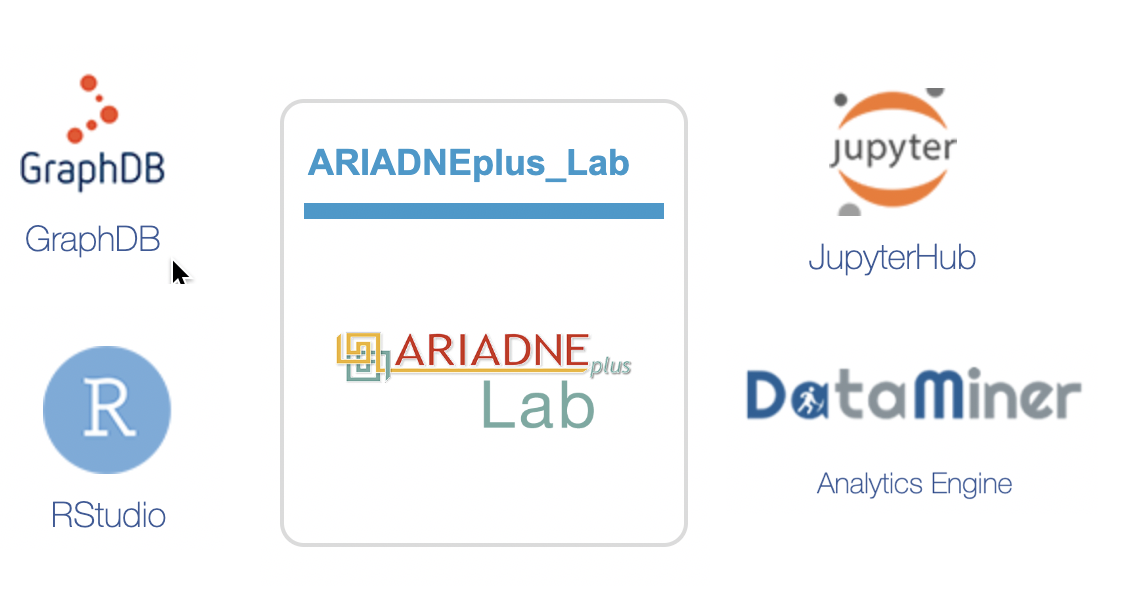Introduction
The ARIADNE Lab provides archaeologists and scholars with a virtual research lab and a set of tools to aggregate the data of the ARIADNE infrastructure, make this data interoperable with personal external data, and to analyse and manipulate the data to answer specific research questions of archaeology or related disciplines.
For example, it is possible to extract from the ARIADNE GraphDB information relating to particular categories of objects (e.g., artefacts, monuments) or events (excavations, surveys and other archaeological activities) according to custom criteria and classify them on the basis of common features such as composition, origin, dimensions, and location.
The data mining tools also make it possible to extract information from textual documents, format and manipulate them according to predefined standards and data models, and then use them to enrich the information already present in ARIADNE, in order to create extended and more complete datasets, and perform more complex and accurate investigations on them.
In the Labs it is, in fact, possible to rearrange, manipulate and analyse external and aggregated data in a variety of ways, and generate as a result, statistical reports organized by typology, number of occurrences, geographical distribution and so on, out of which is also possible to produce on-the-fly complex graphs and thematic maps. The high configurability of the environments, the spectrum of possibilities provided by the deployable tools and their combined use, offer a potentially infinite set of possibilities to explore and extract knowledge out of all the ARIADNE data held within the Portal.
What are the added value and the benefits of the Lab VRE?
- JupyterHub is pre-installed and ready for use (along with RStudio and Analytics Engine).
- Powerful computational resources are provided for script testing.
- The ARIADNE Portal can identify datasets of interest.
- Collaborative working is made easier.
Accessing the Lab
The Lab can be accessed at: https://ariadne.d4science.org/web/ariadneplus_lab/. New users will have to register the first time they access ARIADNE on D4Science.
Data sources
Lab users can import their own datafiles into their workspace as well as those from the ARIADNE Knowledgebase. Further information about the latter are provided in the documentation (c.f.).
Available services
A number of services are available for use within the VRE. A personal token is provided to enable VRE users access to these.
JupyterHub
The JupyterHub enables the exploitation of computational environments and resources without burdening users with installation and maintenance tasks. The JupyterHub environment is (i) preconfigured with libraries and packages to ease the execution of common data analytics tasks, and (ii) provides access to the Workspace making sharing of resources with other members much easier.
RStudio
RStudio is an integrated development environment (IDE) for R. It includes a console, syntax-highlighting editor that supports direct code execution, as well as tools for plotting, history, debugging and workspace management. Ref: https://www.rstudio.com/products/rstudio/
Analytics Engine (DataMiner)
The DataMiner Analytics Engine permits the execution of an array of analytics methods by transparently relying on distributed computing infrastructure. Executions can run either on multi-core machines or on different computational platforms, such as D4Science and other different private and commercial Cloud providers. New software can be integrated by using a dedicated Software Importer (SAI). DOI: 10.5281/zenodo.5503432
GraphDB
GraphDB provides researchers with access to the ARIADNEpPlus Knowledge Base, including all the partner data as a Linked Open Data set and modelled according to the ARIADNE ontology. With GraphDB, researchers can explore the knowledge base with the available web GUI or programmatically with SPARQL queries.
Documentation (KB-guide-v1.0) is provided as a python notebook, a PDF file or in Markdown format at https://data.d4science.net/EvVX.
The python notebook can be run on the JupyterHub tool available in the ARIADNEplus Lab VRE at
https://ariadne.d4science.org/group/ariadneplus_lab/jupyterhub. The guide also contains several examples of queries that can be run on the ARIADNE Knowledge base. Users should copy the notebook to a Jupyter instance in order to play with it and to create their own notebooks for their analysis of the ARIADNEplus Knowledge Base.

